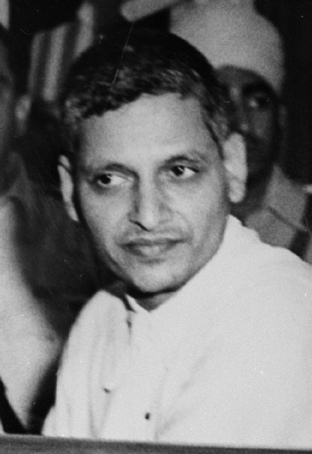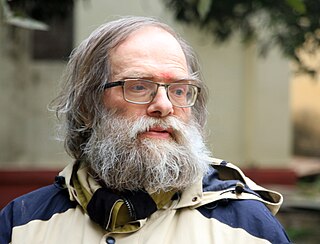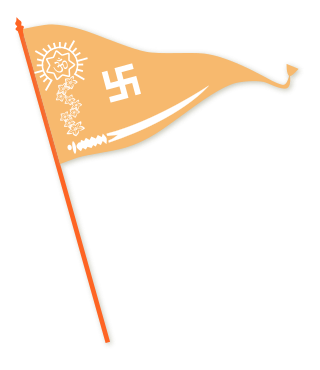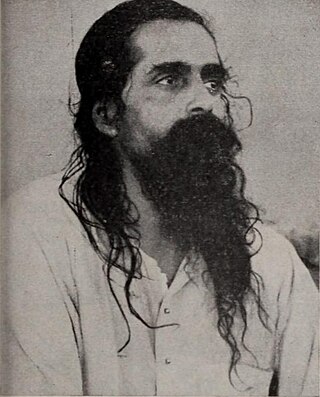Related Research Articles

Nathuram Vinayak Godse was the assassin of Mahatma Gandhi. He was a Hindu nationalist from Maharashtra who shot Gandhi in the chest three times at point blank range at a multi-faith prayer meeting in Birla House in New Delhi on 30 January 1948.

Rashtriya Swayamsevak Sangh is an Indian far-right, Hindu nationalist volunteer paramilitary organisation. It is the progenitor and leader of a large body of organisations called the Sangh Parivar, which has developed a presence in all facets of Indian society and includes the Bharatiya Janata Party, the ruling political party under the Prime Minister Narendra Modi. The present Sarsanghchalak of the RSS is Mohan Bhagwat.
Hindutva is a political ideology encompassing the cultural justification of Hindu nationalism and the belief in establishing Hindu hegemony within India. The political ideology was formulated by Vinayak Damodar Savarkar in 1922. It is used by the Rashtriya Swayamsevak Sangh (RSS), the Vishva Hindu Parishad (VHP), the Bharatiya Janata Party (BJP) and other organisations, collectively called the Sangh Parivar.

The Bharatiya Janata Party is a political party in India and one of the two major Indian political parties alongside the Indian National Congress. Since 2014, it has been the ruling political party in India under the incumbent Prime Minister Narendra Modi. The BJP is aligned with right-wing politics and has close ideological and organisational links to the Rashtriya Swayamsevak Sangh (RSS) volunteer paramilitary organisation. Its policies adhere to Hindutva, a Hindu nationalist ideology. As of December 2023, it is the country's biggest political party in terms of representation in the Parliament of India as well as state legislatures.

Koenraad Elst is a Flemish author, known primarily for his adherence to the Hindutva ideology and support of the Out of India theory. Scholars accuse him of harboring Islamophobia.

Vinayak Damodar Savarkar, Marathi pronunciation: [ʋinaːjək saːʋəɾkəɾ]; 28 May 1883 – 26 February 1966) was an Indian independence activist, politician, and writer. Savarkar developed the Hindu nationalist political ideology of Hindutva while imprisoned at Ratnagiri in 1922. He was a leading figure in the Hindu Mahasabha. He started using the honorific prefix Veer ("brave") since he wrote his autobiography. Savarkar joined the Hindu Mahasabha and popularized the term Hindutva (Hinduness), to create a collective "Hindu" identity as an essence of Bharat (India). Savarkar was an atheist.
The Sangh Parivar refers, as an umbrella term, to the collection of Hindutva organisations spawned by the Rashtriya Swayamsevak Sangh (RSS), which remain affiliated to it. These include the political party Bharatiya Janata Party, religious organisation Vishva Hindu Parishad, students union Akhil Bharatiya Vidyarthi Parishad (ABVP), religious militant organisation Bajrang Dal that forms the youth wing of the Vishva Hindu Parishad (VHP), and the worker's union Bharatiya Kisan Sangh. It is also often taken to include allied organisations such as the Shiv Sena, which share the ideology of the RSS.

Keshav Baliram Hedgewar, also known by his moniker Doctorji, was an Indian physician and the founder of the Rashtriya Swayamsevak Sangh (RSS). Hedgewar founded the RSS in Nagpur in 1925, based on the ideology of Hindutva with the intention of creating a Hindu Rashtra.

Akhil Bharat Hindu Mahasabha is a Hindu nationalist political party in India.

Madhav Sadashivrao Golwalkar, popularly known as Guruji was the second Sarsanghchalak ("Chief") of the Rashtriya Swayamsevak Sangh (RSS). Golwalkar is considered one of the most influential and prominent figures among Rashtriya Swayamsevak Sangh by his followers.
The National Council of Educational Research and Training (NCERT) is an apex resource organisation set up by the Government of India to assist and advise the central and state governments on academic matters related to school education. The model textbooks published by the council for adoption by school systems across India have generated controversies over the years. They have been accused of using orwellian tactics to reflect the political views of the party in power in the Government of India. Recently it's been under scrutiny for saffronisation.
Abhinav Bharat is a Hindu militant organization founded by retired Indian Army Major Ramesh Upadhyay in 2006 in Pune, India. It has a large base in Madhya Pradesh. The organization is believed to be the revived form of the pre-Independence era Abhinav Bharat Society. The activities of the organisations received widespread attention after Maharashtra Anti Terrorist Squad (ATS) arrested its member for the 2006 Malegaon bombings case. It has no relationship to the Mumbai-based charitable trust of the same name.
Hindu terrorism, sometimes called Hindutva terror or, metonymically, saffron terror, refer to terrorist acts carried out on the basis of motivations in broad association with Hindu nationalism or Hindutva.
Hindu Revolution is a term in Hindu nationalism referring to a sociopolitical movement aiming to overthrow untouchability and casteism to unified social and political community to create the foundations of a modern nation.
Hindu nationalism has been collectively referred to as the expression of social and political thought, based on the native spiritual and cultural traditions of the Indian subcontinent. "Hindu nationalism" is a simplistic translation of हिन्दू राष्ट्रवाद. It is better described as "Hindu polity".
The Akhil Bharatiya Itihas Sankalan Yojana (ABISY) is a subsidiary of the Rashtriya Swayamsevak Sangh (RSS), a Hindu-nationalist organisation. Envisioned in 1973 by Moropant Pingley, a pracharak of the RSS, and founded in 1978-79, ABISY holds that India's history was distorted by the British Raj, and seeks to correct the biases. Scholars state that the actual aim of the organisation is to rewrite Indian history from a Hindu nationalist perspective.
Yellapragada Sudershan Rao is an Indian historian, who was appointed as the chairperson of the Indian Council of Historical Research (ICHR) by the Government of India, serving from July 2014 to July 2017. He was formerly a professor of history at Kakatiya University in Telangana, and had previously served as a member of the ICHR. He was a member of the Akhil Bharatiya Itihas Sankalan Yojana, an affiliate of the Hindu-nationalist Rashtriya Swayamsevak Sangh (RSS), and the head of its Andhra Pradesh branch.

Vasudev Devnani is an Indian politician from Rajasthan serving as the speaker of the Rajasthan Legislative Assembly. He is also an MLA from Ajmer North. He is a member of the Bharatiya Janata Party. Vasudev Devnani is the first Sindhi to become speaker in Rajasthan assembly.

Historiography is the study of the methods of historians in developing history as an academic discipline, and by extension is any body of historical work on a particular subject. The historiography of a specific topic covers how historians have studied that topic using particular sources, techniques, and theoretical approaches. Historiography is defined as "the study of the way history has been and is written – the history of historical writing", which means that, "When you study 'historiography' you do not study the events of the past directly, but the changing interpretations of those events in the works of individual historians."

Godse's Children: Hindutva Terror in India is a 2011 Indian political history book by Indian journalist Subhash Gatade that focuses on the phenomenon of Hindutva terrorism.
References
- ↑ "Editorial: Unfit to rule". Frontline. Vol. 15, no. 25. 5 December 1998. Retrieved 8 November 2014.
- 1 2 Raghavan, B. S. (12 September 2001). "Saffronisation". The Hindu . Archived from the original on 14 May 2007.
- ↑ Bhattacharya, Neeladri (2009). "Teaching History in Schools: The Politics of Textbooks in India". History Workshop Journal. 67 (67): 99–110. doi:10.1093/hwj/dbn050. JSTOR 40646212. S2CID 154421051.
- ↑ Bénéï, Veronique (2005). Manufacturing Citizenship: education and nationalism in Europe, South Asia, and China. New York, NY: Routledge. pp. 156–159. ISBN 0-415-36488-4.
- 1 2 Akshaya, Mukul (24 June 2015). "Saffronization fears over history textbooks rewrite plans". The Times of India. Retrieved 9 March 2016.
- 1 2 Ramesh, Randeep (25 June 2004). "Another rewrite for India's history books". The Guardian. Retrieved 10 March 2016.
- ↑ Raza, Danish (8 December 2014). "Saffronising textbooks : Where myth and dogma replace history". Hindustan Times. Retrieved 9 March 2016.
- 1 2 Singh, Amrik (25 August 2001). "Saffronisation and textbooks". The Hindu . Retrieved 10 March 2016.[ dead link ]
- ↑ Goswami, Rakesh (20 January 2016). "Saffronisation ? Raje scraps Cong textbooks, spends Rs 37 cr on new ones". Hindustan Times. Retrieved 9 March 2016.
- ↑ "Revised textbooks from 2017–18 academic year". The Hindu. 10 June 2015. Retrieved 10 March 2016.
- ↑ "'Nathuram Godse was a patriot,' says BJP's Pragya Thakur; sparks outrage". www.hindustantimes.com. 16 May 2019. Retrieved 16 May 2019.
- ↑ Yasir, Sameer (4 February 2020). "Gandhi's Killer Evokes Admiration as Never Before". The New York Times. ISSN 0362-4331 . Retrieved 5 February 2020.
- ↑ "Port Blair airport gets Rs 450 cr quake-proof makeover". Business Standard India. Press Trust of India. 9 June 2009. Archived from the original on 14 October 2021. Retrieved 20 February 2010.
- ↑ "President unveils Savarkar portrait in Central Hall of Parliament". Zee News. 26 February 2003. Archived from the original on 24 October 2020. Retrieved 21 August 2020.